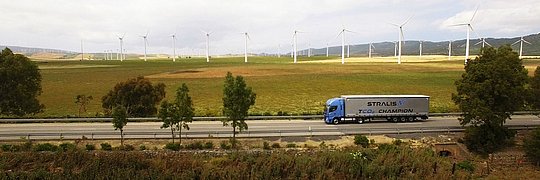
The LNG study on heavy goods transport
dena has summarised the current state of development of LNG in heavy goods transport and outlined the challenges and necessary measures for a market ramp-up of the fuel in Germany in a study published in both English and German.
Study creates momentum
The study is the starting point for the LNG Task Force as a joint development platform for LNG in road transport.
The challenge
Liquefied natural gas (LNG) plays an important role in achieving the German government’s energy and climate policy targets. However, its use in German road freight transport is still comparatively low. Countries such as China, France, the Netherlands and the United States have more practical experience. There is a need to catch up, especially in light of the fact that, according to a forecast by the Federal Ministry of Transport and Digital Infrastructure (BMVI), transport activity in Germany will increase by 39 per cent by 2030, compared to 2010. Increasing energy consumption, greenhouse gas emissions and environmental pollution are the result. Despite increasing vehicle efficiency, alternative drive and fuel concepts are therefore needed to reduce emissions in road freight transport in the short term. Better background information and a joint market development strategy are required in order to establish LNG as a competitive alternative to diesel.
What we have done:
dena took up the challenge and produced a white paper on the topic of liquefied natural gas in road freight transport. It also includes outlooks for market developments in other countries, although its focus is on the German market. The aim was to illustrate the enormous potential of LNG to reduce emissions. Relevant market barriers were identified and recommendations for action were made for politics and business. The study was written in both German and English with an international target group in mind, as the area of application for LNG is long-distance lorry transport in particular.